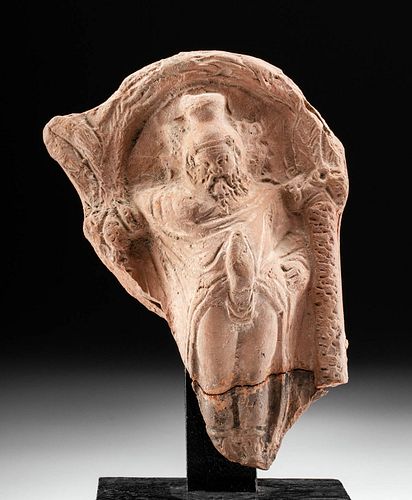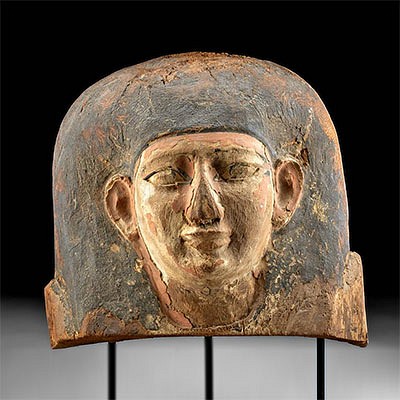Egyptian Ptolemaic Terracotta Priapus, ex Christie's
Lot 11c
About Seller
Artemis Gallery
686 S Taylor Ave, Ste 106
Louisville, CO 80027
United States
Selling antiquities, ancient and ethnographic art online since 1993, Artemis Gallery specializes in Classical Antiquities (Egyptian, Greek, Roman, Near Eastern), Asian, Pre-Columbian, African / Tribal / Oceanographic art. Our extensive inventory includes pottery, stone, metal, wood, glass and textil...Read more
Categories
Estimate:
$2,500 - $3,000
Absentee vs Live bid
Two ways to bid:
- Leave a max absentee bid and the platform will bid on your behalf up to your maximum bid during the live auction.
- Bid live during the auction and your bids will be submitted real-time to the auctioneer.
Bid Increments
| Price | Bid Increment |
|---|---|
| $0 | $25 |
| $300 | $50 |
| $1,000 | $100 |
| $2,000 | $250 |
| $5,000 | $500 |
| $10,000 | $1,000 |
| $20,000 | $2,500 |
| $50,000 | $5,000 |
| $100,000 | $10,000 |
| $200,000 | $20,000 |
About Auction
By Artemis Gallery
Aug 27, 2020
Set Reminder
2020-08-27 10:00:00
2020-08-27 10:00:00
America/New_York
Bidsquare
Bidsquare : VARIETY SALE | Antiquities & Ethnographic Art
https://www.bidsquare.com/auctions/artemis-gallery/variety-sale-antiquities-ethnographic-art-5477
Around the world & back in time - be amazed at the treasures you will find. Antiquities from Egypt, Greece, Italy and the Near East, Asian, Pre-Columbian, African / Tribal / Oceanic, Native American, Spanish Colonial, Russian Icons, Fine Art, much more! Artemis Gallery info@artemisgallery.com
Around the world & back in time - be amazed at the treasures you will find. Antiquities from Egypt, Greece, Italy and the Near East, Asian, Pre-Columbian, African / Tribal / Oceanic, Native American, Spanish Colonial, Russian Icons, Fine Art, much more! Artemis Gallery info@artemisgallery.com
- Lot Description
Egypt, mid-Ptolemaic to Romano-Egyptian period, ca. 2nd century BCE to 2nd century CE. A finely preserved, hollow-molded terracotta effigy of Priapus, the god of fertility as well as animal and agricultural fertility. Priapus stands with his left hand at his waist and his right outstretched towards the palm tree border, wears a flowing tunic across his upper body, and presents his bulbous phallus that protrudes from between his bare legs. His aged face and shaggy beard are topped with a large helmet framed with a foliate fillet beneath an archway of palm branches that alludes to his association with bountiful vegetative growth and sustainability. Size: 3.875" W x 5.2" H (9.8 cm x 13.2 cm); 6.8" H (17.3 cm) on included custom stand.
A Roman bronze Priapus statue of a larger size hammered for $78,000 at Christie's, New York "Antiquities" auction (sale 1846, June 8, 2007, lot 153).
Provenance: private A.L. collection, Auburn Hills, Michigan, USA, acquired in March 1994 from Royal-Athena Galleries, New York, New York, USA; ex-Christie's, London "Antiquities" auction (sale 5100, December 8, 1993, part of lot 107); ex-private English collection of Egyptian Graeco-Roman Terracottas
All items legal to buy/sell under U.S. Statute covering cultural patrimony Code 2600, CHAPTER 14, and are guaranteed to be as described or your money back.
A Certificate of Authenticity will accompany all winning bids.
We ship worldwide and handle all shipping in-house for your convenience.
#157350Repairs to lower legs below knees with chips and adhesive residue along break lines; losses to areas of ankles, feet, and left peripheries as shown. Softening to some finer details and chips to peripheries. Nice earthen deposits throughout.Condition
- Shipping Info
-
All shipping is handled in-house for your convenience. Your invoice from Artemis Gallery will include shipping calculation instructions. If in doubt, please inquire BEFORE bidding for estimated shipping costs for individual items.
-
- Buyer's Premium



 EUR
EUR CAD
CAD AUD
AUD GBP
GBP MXN
MXN HKD
HKD CNY
CNY MYR
MYR SEK
SEK SGD
SGD CHF
CHF THB
THB














